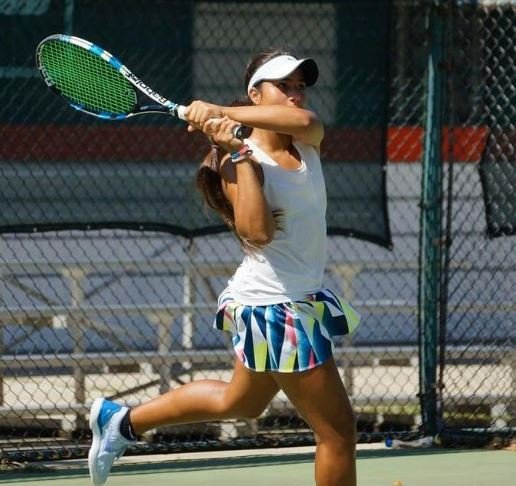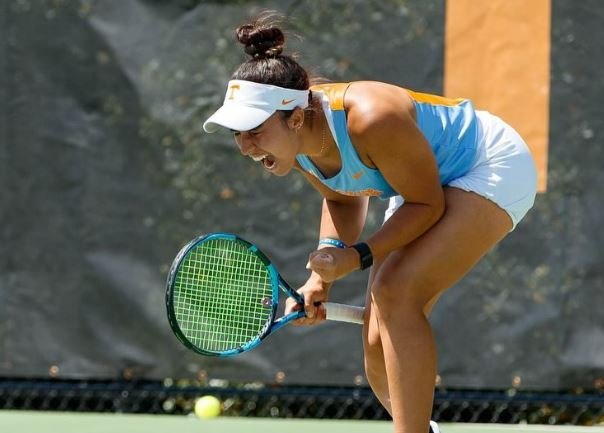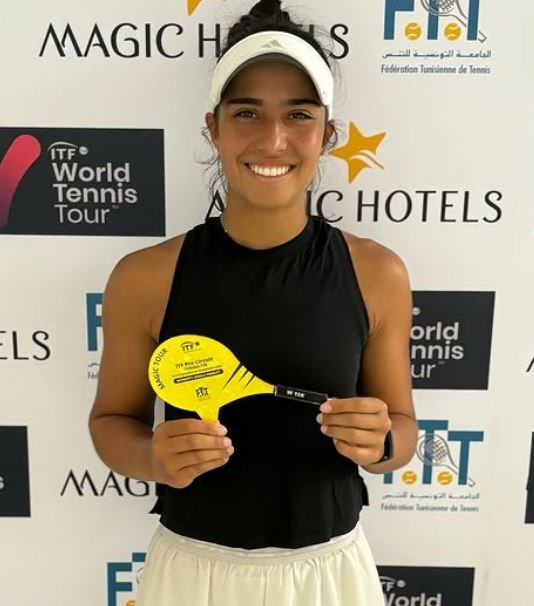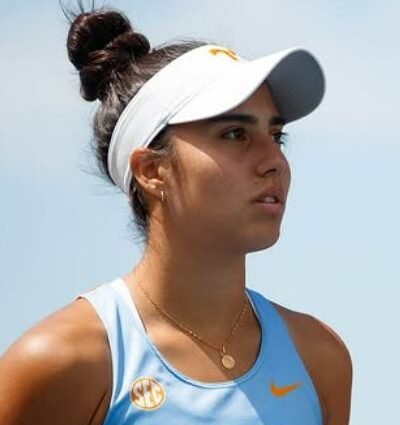For years, tennis in Venezuela has struggled to establish itself on the international stage. While the country has produced a handful of players who made brief forays into the top 100, the landscape today remains sadly barren. Currently, Venezuela has just 2 men in the ATP top 1000, and a single female player on the WTA Tour: Sofia Cabezas, currently sitting at No.784.
At 23, Cabezas stands alone in the rankings, a solitary representative of a nation where tennis is far from a mainstream sport. Her journey, however, shows that determination, and a deep love for the game, can, and has, broken her free from the constraints of her homeland’s tennis infrastructure.
Where It All Began
Cabezas’ introduction to the sport came through family ties rather than a structured pathway.
“I got into tennis because of my dad. He played in Venezuela growing up, so I think he wanted me and my older brother – especially my brother – to get into it. He signed up my brother for tennis lessons at a country club, and I would just go and watch his practice. At some point, I started telling my dad that I also wanted to play tennis. He signed me up for tennis lessons at the country club a couple of days a week when I was 6 or 7, and I totally loved it.”

Like many players in countries where tennis lacks a strong developmental system, Cabezas’ early years were informal, driven by personal motivation and interest, rather than national programs. Competitive aspirations didn’t emerge until she experienced her first taste of match play.
“It wasn’t competitive or anything—it was just for fun. And it stayed that way until I was 10 years old. My first tennis match was a country club match, and I remember I got completely destroyed. I have always been super competitive, so after that, I told my dad that I wanted to start playing more matches and to practice more often.”
The College Tennis Pathway
Without a structured junior pathway to transition into professional tennis, many Venezuelan players seek opportunities abroad. For Cabezas, college tennis in the United States provided a crucial stepping stone. Cabezas graduated from the University of Tennessee last year, and speaks extremely highly of the college path.
“I absolutely loved it. At first – I’m not going to lie—I didn’t want to go to college, just because I didn’t know much about how things worked, and because I wanted to play professionally. I wasn’t sure if that was the right path for me. But I’m so glad that my mum pushed me to go, because it is one of the best decisions I’ve ever made. I grew so much as a person and as a tennis player.”
College tennis not only allowed Cabezas to refine her game but also provided the kind of structured training and competitive experience that she lacked in Venezuela.
“The level in college tennis is so high that I truly believe it helped me to transition to the tour. I was also so lucky that I had incredible coaches and teammates supporting me all the time.”

One of the most significant benefits of playing collegiate tennis in the U.S. is the opportunity to do so on scholarship. For Cabezas, this was a game-changer, and she admits that without it, she certainly wouldn’t be where she is today.
“(The scholarship) kind of saved my life. Just because I wouldn’t have been able to pay for college in this country. I’m truly grateful for the opportunities that I have gotten through this sport and with the people that helped me through this process.”

The Sad Decline of Tennis in Venezuela
Cabezas’ rise to the professional ranks is of particularly interest, given the state of tennis in Venezuela. Unlike other South American countries with strong tennis traditions, such as Argentina and Brazil, Venezuela has not invested in a serious tennis infrastructure. Cabezas notes that the sport is not taken seriously as a profession.
“I think the tennis culture in Venezuela is very, very different from many other countries. I believe in Venezuela, people don’t see tennis as a profession. They see it as a hobby, and I think now they are seeing it maybe as a way to get into college, which is great. I just believe that they don’t take tennis as seriously as other sports, like maybe soccer or baseball.”
One of the biggest barriers to tennis development in Venezuela is the lack of qualified coaches and training programs that is afforded to players in other countries.
“Not many people see tennis as a profession, so it’s challenging to find people that are truly qualified. I was super lucky that one of the best coaches in Venezuela lived in my city, so I had the opportunity to practice with him growing up. But since Venezuela is not a big tennis country, the most qualified people and the best players are leaving the country.”
This trend, where the most talented coaches and players move abroad, has created a stagnant environment for young prospects, which Cabezas is clearly frustrated by.
“How is tennis in Venezuela going to keep growing if the best players and coaches are leaving the country? How is tennis going to develop if the tennis community is getting smaller and smaller by the year?”
A Lack of Competition and Funding
Unlike most tennis nations, Venezuela has not hosted international tournaments in years. This lack of competition makes it difficult for players to gain valuable match experience.
“For me, growing up, facilities were never an issue, and I don’t think it is an issue nowadays because there are plenty of tennis courts everywhere. The biggest issue is tournaments. When I was 13 or 14 years old, the ITF decided to cancel all the tournaments in Venezuela because of the (economic and political) situation. And for many Venezuelans, those ITFs were the only opportunity they had to play against people from other countries and compare their level. Until this day, there are no international tournaments in Venezuela.”
Without the ability to compete against international opponents, many young Venezuelan players are left without a realistic path to improve.
“There are State, Regional, and National tournaments, but the tennis community is so small that you are just playing the same people over and over.”
Another major issue is the lack of financial support that is available to potential talent.
“The country and federation don’t provide any kind of help to tennis players. We all know that tennis is an expensive sport, especially if you want to be a professional or somewhat good at it. It’s just really sad to see how much talent is being wasted just because people are not receiving any kind of help.”
The Future of Venezuelan Tennis
Historically, Venezuela has produced only a handful of successful professional players. Garbiñe Muguruza, born in Caracas, moved to Spain at age 6, and switched her allegiances to representing her new home throughout her career.
Maria Vento-Kabchi (career-high No. 26) and Milagros Sequera (career-high No. 48) were the last Venezuelan women to break into the Top 100. On the men’s side, the nation has fared little better, with Jorge Andrew (career-high No. 66) and Nicolas Pereira (career-high No. 74) the most successful tennis exports.
As Cabezas alluded to, the absence of professional tournaments compounds the issue. The last ITF events in Venezuela were held in 2015. In the 60’s and 70’s, Caracas played host to ATP events, with legends like Rod Laver and Margaret Court lifting trophies. Yet today, professional tennis in Venezuela is non-existent.
A Lone Flag-Bearer
For now, Sofia Cabezas remains Venezuela’s only ranked female player—a position that comes with both pride and pressure. She remains optimistic about her own career, despite recent injuries. Cabezas has spent the majority of the last few years on the collegiate circuit, but last year she stepped out in to the ITF Tour, and made a big impact.
In what was essentially her debut ITF events, Cabezas spent 3 weeks in Monastir, Tunisia, competing in a trio of ITF 15 tournaments. In the first 2, Cabezas made it through qualifying, and all the way to the final, while in the 3rd event, she again got through qualifying, and through to the semi-finals.
Within just 3 weeks, Cabezas gained 22 matches of experience under her belt, winning 19 of them. Her ranking jumped from being unranked at the start of September, to 784 by December.

So far this season, Cabezas has unfortunately been sidelined with injury, but it shouldn’t be too long until we see her back on court.
“I’m very happy with my results so far, even though I know there’s still a lot to accomplish and improve. Unfortunately, I haven’t been able to play much this year because I got injured at the end of last year, so I have just been taking care of myself. But it’s looking like in a few weeks I’ll be able to compete again.”
Whether Cabezas can continue climbing the rankings remains to be seen. But for Venezuelan tennis, she represents hope in a system that has given its players little to build upon.
Follow The Tennis Site on Facebook and X: @thetennissite
Follow Todd Scoullar on X: @toddscoullar


Comments are closed, but trackbacks and pingbacks are open.